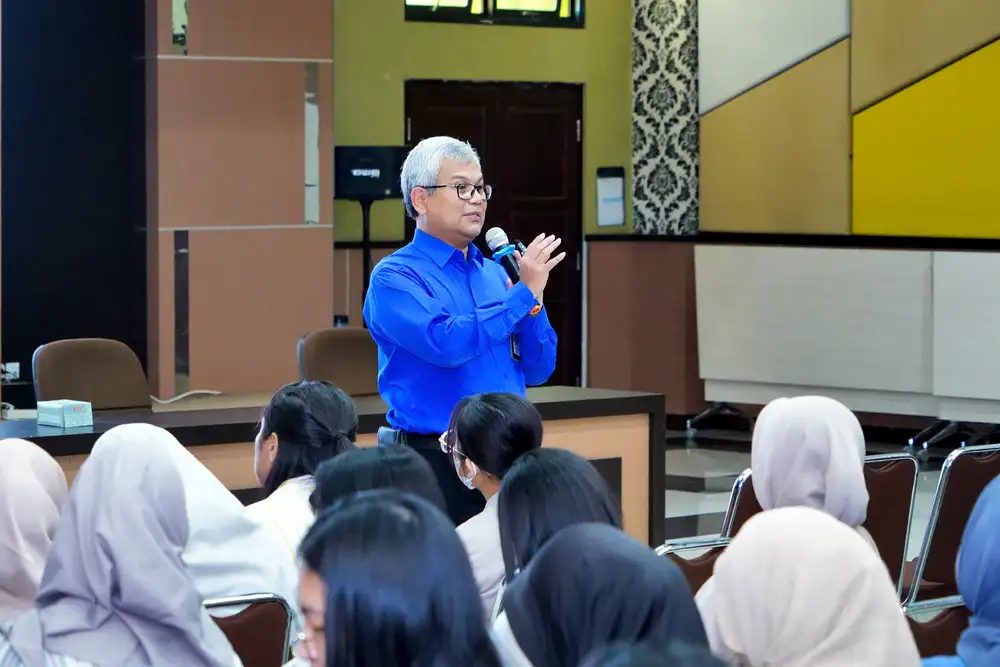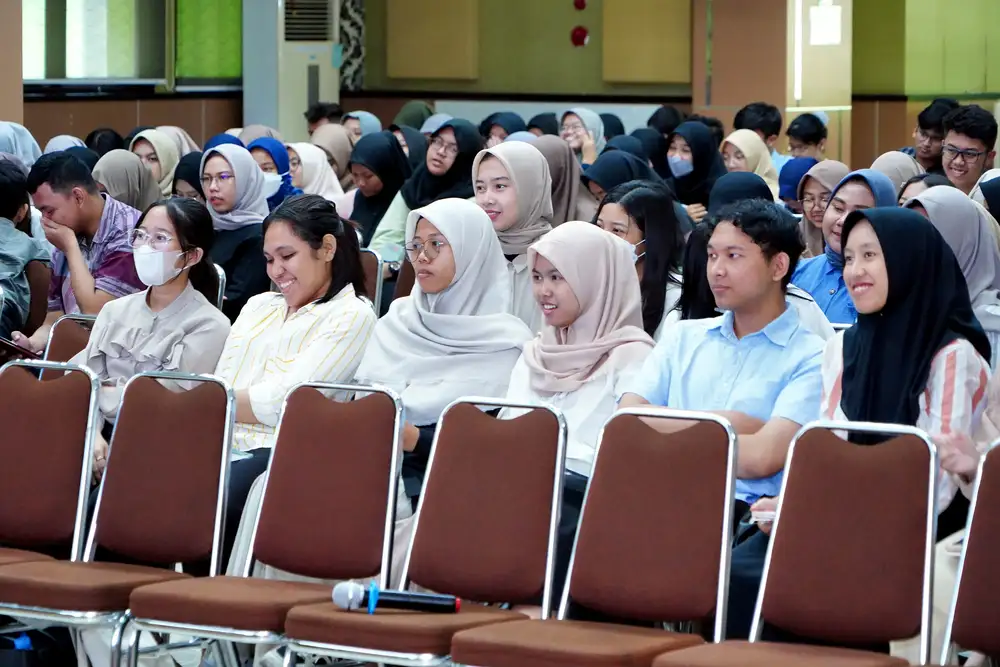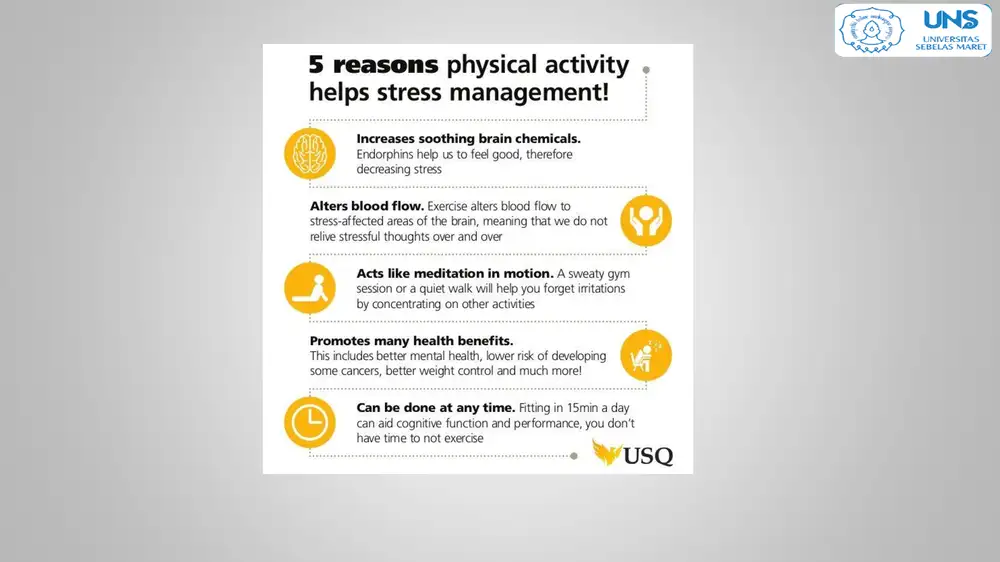Professor of FK UNS in the field of Physiology: Relationship between Sports, Stress and Immunity

Is it true that doing good exercise can reduce stress and strengthen a person's immunity?
This topic was discussed at the Expert Lecture held by the Physiology Laboratory of the Faculty of Medicine (FK) Universitas Sebelas Maret (UNS) on Wednesday (8/11/2023). Taking the theme of Exercise Physiology, this activity was attended by hundreds of FK UNS students.
Material about the relationship between exercise, stress and the immune system was delivered by Professor of FK UNS in the field of Physiology, Prof. Dr. Hartono, dr., M.Si. who also serves as Director of UNS Hospital.
“In principle, this (aerobic) exercise must be done gradually, regularly and with the correct training dose. This exercise dosage includes intensity, duration and frequency of exercise. So cardio or aerobic exercise is exercise that has regular or rhythmic movements, can increase heart rate, can trigger muscle contractions and improve blood circulation," he explained.
When discussing training dosage, the first thing that needs attention is the training intensity. In aerobic or cardio sports, the intensity of the exercise can be determined based on the maximum heart rate (Maximal Heart Rate) during the sports activity.
"If we talk about aerobic exercise, the first thing you have to know is what is called maximum heart rate. A simple way to calculate it is 220 minus your age. "For example, if you are 20 years old, then 220 minus 20 gives 200, that is your maximum heart rate during aerobic exercise," he explained.
 |
 |
 |
(Geser untuk foto selanjutnya)
According to Prof. Hartono, exercise is said to be at very high intensity if the heart rate is above 90% of the maximum heart rate and it is recommended to avoid exercise with this very high intensity. Meanwhile, exercise is said to be high intensity if the heart rate is 80-89% of the maximum heart rate.
"So what is recommended is that if only for health and maintaining the condition of the cardiovascular system, do exercise at moderate intensity, namely 60-79% of our maximum heart rate," he continued.
Furthermore, the exercise can bring benefits to the body based on the duration and frequency of exercise.
Exercise aimed at improving cardiovascular health, the recommended duration is a minimum of 30 minutes per day with moderate intensity aerobic activity with a total duration of 150 minutes per week or a minimum of 25 minutes with high intensity at least 3 days a week with a total duration of 75 minutes.
"If the goal is to maintain body weight, it is recommended to exercise 50 minutes per day for a total of 150-250 minutes per week or burn calories of 1200-2000 kcal per week," Prof. Hartono explained.
So, can exercise reduce stress levels?
According to Prof. Hartono, by channeling positive hobbies it can be a form of good stress management.
"Many journals prove that sport can be an effective stress management because it channels positive hobbies. I say positive hobbies because there are teenagers who face stress so they turn to negative hobbies," he explained.
It was further explained that if this pressure is not handled properly, it will manifest in 3 things: mood, changes in behavior, and a decline in the immune system.
 |
 |
 |
(Geser untuk foto selanjutnya)
"If this stressor pressure is left for a long time and is not managed properly, the pressure from the cerebellum will be channeled to the hypothalamus, so there are two pathways, the first is to the adrenal cortex which causes the hormone cortisol to increase and the second is to the adrenal medulla which causes catecholamines to increase and if this increases "a little above the normal limit will destroy the body's defense system," he explained.
This is where exercise plays a role in maintaining the immune system because it inhibits stimulation or pressure that appears in the hypothalamus by producing endorphins through the pituitary gland in the brain. This endorphin hormone will be distributed throughout the body through the nervous system. The endhorphin hormone itself has various benefits for the body, such as reducing pain or discomfort, improving mood, reducing stress and anxiety and improving the immune system.
However Prof. Hartono also warned against overtraining because this will reduce the immune system because it will stimulate macrophage activity so that pro-inflammatory cytokines will increase.
Apart from that, if exercise is done with over-training, the glycolysis process will go through anaerobes, resulting in the production of pyruvic acid and lactic acid as well as free radicals which will damage our endothelium so that the blood vessels become brittle and thicken.
"So, the key word in exercising to maintain health is regularly and with the right dosage," he said.
Public Relation of FK UNS
 bahasa indonesia
bahasa indonesia 



